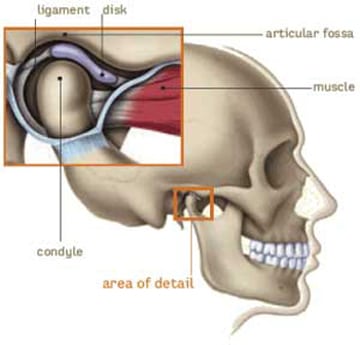The temporomandibular joint (TMJ) connects your jaw bone to the temporal bones on the sides of your skull. The joint moves when you chew, speak, and laugh. Joint dysfunction can cause stiffness and pain and create symptoms throughout your head and neck. Dr. Becker is a Hoffman Estates dentist with advanced training and experience in diagnosing and treating TMJ disorder.
Symptoms of TMJ Disorder
Are your symptoms are related to TMJ? Some symptoms of the disorder include:
- Chronic headaches
- Dizziness
- Face, jaw, neck, or shoulder pain
- Jaw clicking, popping, or stiffness
- Joint tenderness or pain
- Misaligned bite, or a bite that feels off
- Pressure, pain, or ringing in your ears
- Vision problems

Temporomandibular joint
It’s common to experience occasional, mild jaw clicking or discomfort. If you experience these symptoms, it doesn’t necessarily mean you have TMJ disorder. Other conditions can cause similar symptoms, so it’s best to schedule an appointment for an examination.
What Causes It?
Several factors can contribute to TMJ dysfunction, including:
- Arthritis
- Bite problems that can result from missing teeth or poor-quality dental work
- Clenching or grinding teeth
- Connective tissue diseases
Preventing and Treating TMJ Disorder
Prevention
TMJ disorder that results from low-quality dental work can be prevented. Dr. Becker has advanced education and training in occlusion and how to balance the way your teeth fit together. He completed entire programs on occlusion at the Pankey Institute and the U.S. Dental Institute, as well as courses from the Dawson Academy. He uses his advanced training to achieve proper bite whether you’re receiving a single dental crown or extensive work. The results will be stable, even, and comfortable.
Treatment
Dr. Becker will take two-dimensional panoramic x-rays to provide precise images of your jaw and teeth. The images help him identify the cause of your symptoms. He will determine if the issues can be resolved with any of the following options:
- Orthodontic treatment – Braces or some other form of orthodontic treatment can be used to reposition your teeth and align your bite.
- Replace restorative dental work – Poor occlusion caused by faulty dental work can be corrected by replacing the restorative work.
- Orthotics – If you grind or clench your teeth, have facial pain, or have problems opening and closing your mouth, specific types of orthotics will be recommended.
If you’re experiencing chronic jaw pain or any of the other symptoms related to TMJ dysfunction, call us to schedule an appointment, or complete our Request an Appointment form.
